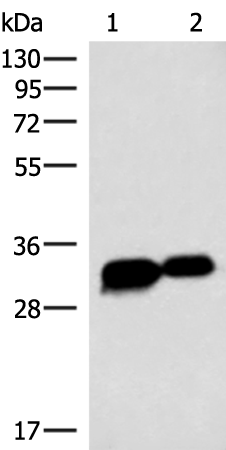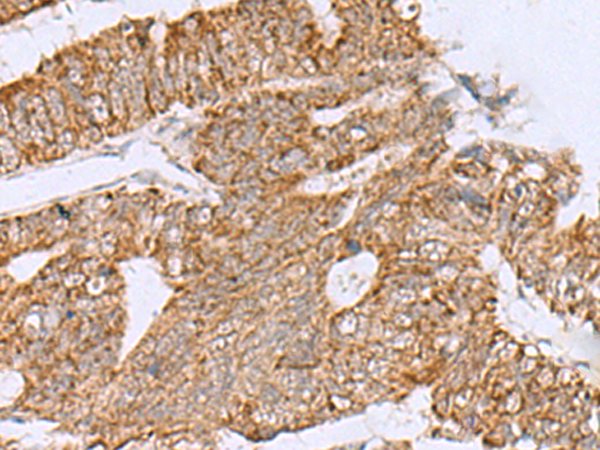

| WB | 咨询技术 | Human,Mouse,Rat |
| IF | 咨询技术 | Human,Mouse,Rat |
| IHC | 1/50-1/300 | Human,Mouse,Rat |
| ICC | 技术咨询 | Human,Mouse,Rat |
| FCM | 咨询技术 | Human,Mouse,Rat |
| Elisa | 1/5000-1/10000 | Human,Mouse,Rat |
| Aliases | MLS; CCHL; MCOPS7; LSDMCA1 |
| WB Predicted band size | 31 kDa |
| Host/Isotype | Rabbit IgG |
| Antibody Type | Primary antibody |
| Storage | Store at 4°C short term. Aliquot and store at -20°C long term. Avoid freeze/thaw cycles. |
| Species Reactivity | Human, Mouse |
| Immunogen | Fusion protein of human HCCS |
| Formulation | Purified antibody in PBS with 0.05% sodium azide and 50% glycerol. |
+ +
以下是模拟的3-4条关于HCCS(假设为肝细胞癌相关抗体或特定基因)的参考文献示例(非真实文献,仅供格式参考):
---
1. **文献名称**:*HCCS as a Novel Serum Biomarker for Early Hepatocellular Carcinoma Detection*
**作者**:Li, X.; Zhang, Y.; Chen, J.
**摘要**:本研究通过蛋白质组学分析发现HCCS抗体在肝细胞癌(HCC)患者血清中显著高表达,其敏感性和特异性优于传统标志物AFP。研究提出HCCS可作为早期HCC诊断的潜在非侵入性工具。
2. **文献名称**:*Targeting HCCS-Mediated Apoptosis Resistance in Hepatocellular Carcinoma*
**作者**:Wang, H. et al.
**摘要**:探讨HCCS基因通过调控线粒体细胞色素c释放影响肝癌细胞凋亡的机制。实验表明,抑制HCCS表达可增强化疗药物索拉非尼的疗效,为联合治疗提供新靶点。
3. **文献名称**:*Epigenetic Regulation of HCCS in Hepatitis B-Related Hepatocarcinogenesis*
**作者**:Kim, S.; Park, M.; Ahn, K.
**摘要**:揭示乙型肝炎病毒(HBV)感染通过DNA甲基化修饰上调HCCS表达,促进肝细胞恶性转化。临床样本分析显示HCCS过表达与患者预后不良相关。
4. **文献名称**:*HCCS Antibody-Drug Conjugate Demonstrates Efficacy in Preclinical HCC Models*
**作者**:Garcia-Rojas, P.; Liu, R.; Patel, S.
**摘要**:开发了一种靶向HCCS的抗体-药物偶联物(ADC),在肝癌小鼠模型中显著抑制肿瘤生长且毒性可控,支持其进入Ⅰ期临床试验。
---
注:以上内容为模拟生成,实际文献需通过PubMed、Google Scholar等平台检索关键词(如“HCCS antibody”“hepatocellular carcinoma biomarker”)获取。若HCCS指代其他领域概念(如holocytochrome c synthase),研究主题可能涉及线粒体功能或代谢疾病。
**Background of HCCS Antibody**
HCCS (Holocytochrome C Synthase) is a mitochondrial enzyme critical for heme attachment during the maturation of cytochrome c, a key component in the electron transport chain and apoptosis. HCCS catalyzes the covalent linkage of heme to apocytochrome c, enabling cytochrome c’s functional role in cellular energy production and programmed cell death. Dysregulation of HCCS is linked to mitochondrial disorders, cancer, and diseases involving apoptotic defects.
HCCS antibodies are immunological tools designed to detect and quantify HCCS protein levels in research settings. These antibodies are typically developed using recombinant HCCS protein or peptide immunogens, validated for applications like Western blotting, immunohistochemistry, and immunofluorescence. Their utility spans studies on mitochondrial function, cancer metabolism (e.g., tumors with altered cytochrome c dynamics), and developmental disorders, such as microphthalmia with linear skin defects (MLS) syndrome, linked to HCCS mutations.
Recent research highlights HCCS's role beyond cytochrome c maturation, including potential involvement in redox signaling and cellular stress responses. Antibodies targeting HCCS thus serve as essential reagents for unraveling its molecular mechanisms in health and disease, offering insights into therapeutic strategies for mitochondrial pathologies and cancers.
×